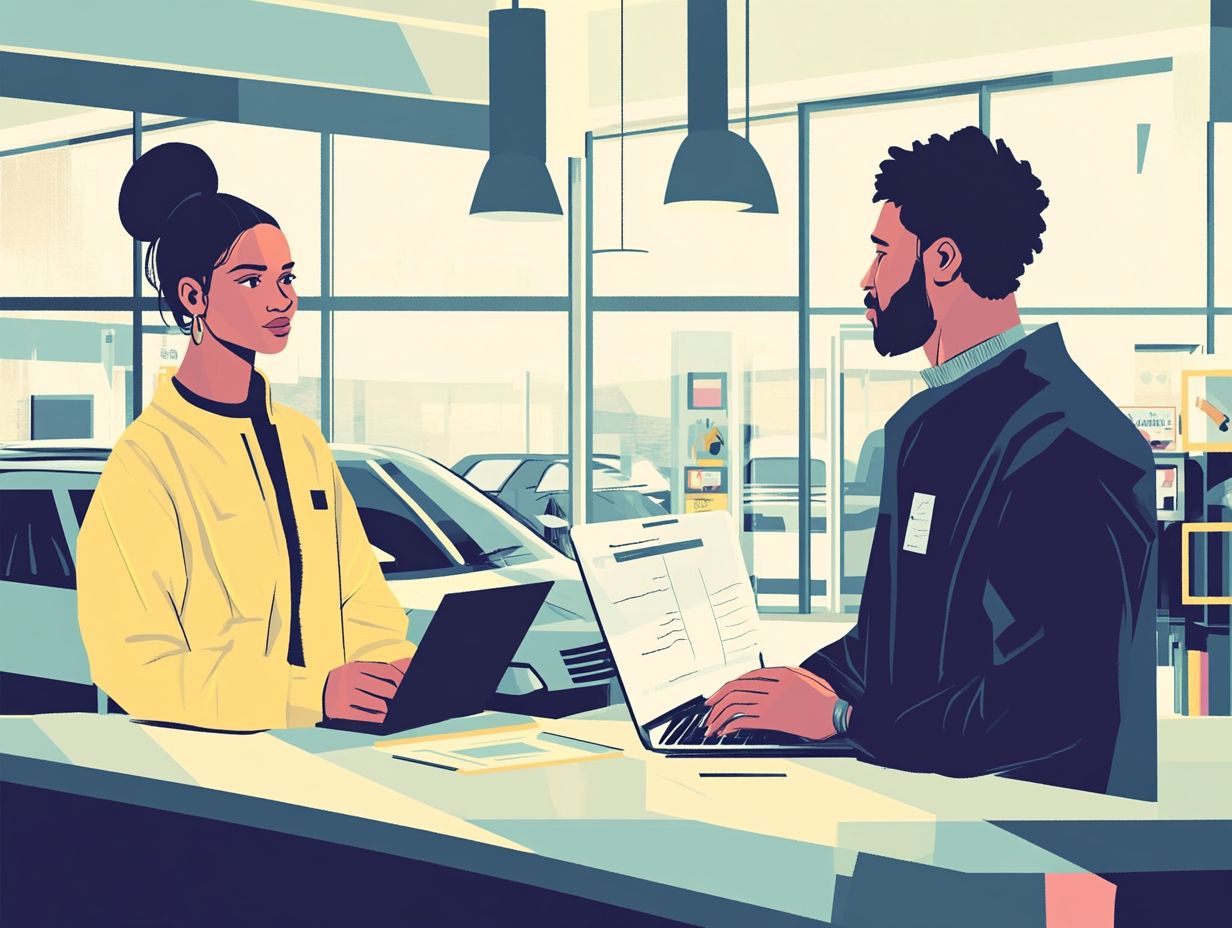Negotiating Car Prices: Do’s and Don’ts
Car buying can be thrilling, but negotiating prices can feel overwhelming. With a multitude of factors to weigh and various strategies to consider, understanding the right approach can make a significant impact.
This article delves into the essential do’s and don’ts that will empower you to secure the best deal possible. By researching market value and honing your negotiation skills, you can equip yourself with the knowledge necessary to drive away feeling completely satisfied.
Contents
- Key Takeaways:
- 1. Do: Research the Market Value of the Car
- 2. Don’t: Fall for High-Pressure Sales Tactics
- 3. Do: Know Your Budget and Stick to It
- 4. Don’t: Focus Only on the Monthly Payment
- 5. Do: Consider All Factors, Not Just Price
- 6. Don’t: Be Afraid to Walk Away
- 7. Do: Negotiate in Person, Not Over the Phone
- 8. Don’t: Reveal Your Trade-In Too Early
- 9. Do: Be Prepared to Compromise
- 10. Don’t: Forget to Check for Hidden Fees
- 11. Do: Get Pre-Approved for Financing
- 12. Don’t: Be Afraid to Ask for Discounts or Incentives
- 13. Do: Take Your Time and Be Patient
- 14. Don’t: Ignore the Importance of a Test Drive
- 15. Do: Get Everything in Writing
- What Are the Benefits of Negotiating Car Prices?
- Frequently Asked Questions
- What are some key tips for negotiating car prices?
- Should I mention my trade-in during negotiations?
- What are some common negotiating tactics used by car salesmen?
- Is it possible to negotiate the price of a new car?
- What are some common mistakes to avoid when negotiating car prices?
- Should I negotiate the price of a used car?
Key Takeaways:

Research the market value of the car before negotiating to ensure you are getting a fair price.
Avoid high-pressure sales tactics and stick to your budget when negotiating.
Look at all costs, not just what you pay monthly, and be prepared to compromise during negotiations.
1. Do: Research the Market Value of the Car
Researching the market value of a car is essential for you as a first-time buyer. It helps you understand the fair price and equips you to negotiate effectively with car dealers.
Using reputable resources like Kelley Blue Book, NADAguides, and Edmunds can greatly enhance your understanding. These platforms offer valuable insights into vehicle pricing, considering factors such as the car s model, year, mileage, and condition.
Familiarizing yourself with the Manufacturer’s Suggested Retail Price (MSRP) the price recommended by the car manufacturer allows you to see how current market conditions influence real-world pricing. This helps you identify any discrepancies.
By comparing these sources, you can gain a well-rounded perspective on a vehicle’s worth, enabling you to make smarter decisions and avoid overspending.
2. Don’t: Fall for High-Pressure Sales Tactics
High-pressure sales tactics used by car dealers can lead you to make hasty decisions that may not align with your budget or needs.
These aggressive strategies often create a false sense of urgency, pushing you to act before you ve had sufficient time to evaluate your options. Techniques like limited-time offers and misleading discounts are commonly employed.
By recognizing these tactics, you can stay grounded and resist the pressure. Discuss potential purchases with family or friends to ensure you make informed decisions.
Report unethical practices to consumer protection agencies to help others avoid similar issues. Your vigilance can contribute to a fairer marketplace for everyone.
3. Do: Know Your Budget and Stick to It
Establishing a clear budget is essential for you as a first-time car buyer. It helps you set realistic expectations about car prices and monthly payments.
Take the time to outline all potential expenses, not just the car price. Consider dealership fees, insurance, maintenance, and fuel costs to avoid unexpected financial surprises.
Exploring various financing options is crucial; understand how much you can allocate to monthly car loan payments without straining your budget.
Using a car loan calculator can significantly help you see how different interest rates and loan terms affect total payment amounts. This tool enables you to visualize various payment scenarios, making it easier to choose an option that fits comfortably within your financial parameters.
4. Don’t: Focus Only on the Monthly Payment
Focusing solely on the monthly payment can cause you to overlook crucial factors like interest rates, payment plans, and the total price. These elements can significantly impact your financial commitment to a vehicle.
Honing in exclusively on that monthly figure might lead to missing hidden costs, such as dealer fees or taxes, that can inflate the true expense of your purchase. Not considering the value of any trade-in your current vehicle s worth can result in a deal that s less favorable than it should be.
A narrow focus can lead to financial strain if you later discover that you overpaid. Therefore, it’s essential to evaluate the entire picture, including total costs and potential resale value, to make a smarter investment.
5. Do: Consider All Factors, Not Just Price
Shopping for a car? Look beyond the price. Think about features, trade-in value, payment plans, and available incentives.
Understanding how specific features align with your personal needs can enhance your driving experience, ensuring comfort and satisfaction for years to come. Prioritizing what truly matters be it safety, fuel efficiency, or cutting-edge technology enables you to select a car that complements your lifestyle.
Evaluating your trade-in value can streamline the transition to your new vehicle, potentially lowering your out-of-pocket expenses. By exploring various payment plans, you uncover multiple pathways to ownership.
This approach helps you find a solution that fits your budget and allows you to take full advantage of available incentives, ensuring a comprehensive decision-making process.
6. Don’t: Be Afraid to Walk Away
Being ready to walk away gives you power during negotiations. It sends a clear message to the dealer that you are serious about your budget and not willing to settle for terms that don t align with your needs.
This mindset fosters a sense of control and builds your confidence, making it easier to engage in meaningful dialogue. Keep in mind that there are plenty of options available, which can alleviate any pressure you might feel.
Viewing negotiations as a two-way street allows you to communicate your desires without compromising your principles. Don t hesitate to take breaks and reassess the situation; this can lead to more informed decisions and ultimately better deals.
Embracing this approach could transform what feels like an intimidating process into a rewarding journey.
7. Do: Negotiate in Person, Not Over the Phone

Negotiating in person instead of over the phone can transform your car-buying experience. Face-to-face interactions often lead to clearer communication and more advantageous financing options from dealers.
This personal engagement allows you to read the dealer’s reactions through body language and facial expressions, enabling you to adjust your approach on the spot. Immediate feedback helps clarify misunderstandings and sidesteps the delays that often plague phone negotiations.
Prepare thoroughly to make the most of these meetings. Research vehicle prices, understand your payment options, and outline the key points to discuss.
This level of preparation boosts your confidence and positions you powerfully at the negotiation table, ultimately leading to better deals.
8. Don’t: Reveal Your Trade-In Too Early
Revealing your trade-in too soon in the negotiation process can undermine your position and impact the dealer’s offer, diminishing the overall value of your trade-in.
It s often wise to hold off on mentioning this detail until you ve laid a solid foundation for negotiating the price of the new vehicle. By prioritizing discussions around the purchase of the new car, you can gain leverage for more effective negotiation of your trade-in value.
Before stepping into the dealership, research your vehicle’s worth using trusted valuation guides. Consider factors like mileage, condition, and any upgrades.
This informed approach gives you a clear understanding of your trade-in s potential worth, ensuring you maximize your overall deal.
Take control of your car-buying journey today!
9. Do: Be Prepared to Compromise
Being ready to compromise during negotiations is essential for you as a first-time car buyer. This mindset allows for flexibility while ensuring that your must-haves are met, ultimately leading to a more satisfying car-buying experience.
The thrill of purchasing a new vehicle can quickly turn into frustration if your expectations aren’t aligned. By approaching the negotiation process with an understanding of what aspects are truly non-negotiable like safety features or budget limits you can pinpoint areas where you might be open to making concessions.
Negotiation skills enable you to achieve your desired outcomes while fostering a collaborative atmosphere where both you and the seller feel heard and valued. This openness often leads to unexpected solutions that satisfy both your interests and those of the seller, turning the transaction into a win-win scenario.
10. Don’t: Forget to Check for Hidden Fees
Don t let hidden fees catch you off guard act now and review all costs! Overlooking hidden fees can dramatically inflate the final price of buying a car, so it’s crucial for you to closely examine dealer fees and vehicle registration costs before sealing the deal.
These extra charges can sneak in as documentation fees, dealership add-ons, and even last-minute financing expenses that may not be immediately apparent.
To effectively navigate this intricate landscape, it’s wise to request a detailed breakdown of all associated costs upfront. This way, you can spot any unexpected charges before you commit.
Taking the time to meticulously review each fee allows you to make informed decisions and avoid surprises that could throw your budget off track. By being proactive and diligent, you can act now to secure the best deal!
11. Do: Get Pre-Approved for Financing
Securing pre-approved financing is an essential step in your car-buying journey. It helps you understand your budget, assess potential monthly payments, and simplifies negotiations with dealers.
This also boosts your confidence and establishes you as a serious contender in discussions. With pre-approval in hand, your negotiating power skyrockets, allowing you to concentrate on the vehicle s price rather than stressing over financing terms.
You ll find a variety of financing options available through credit unions and banks, including competitive interest rates, flexible loan terms, and personalized payment structures. Credit unions often offer lower fees and more tailored service, while traditional banks provide established reputations and a broad range of products.
This gives you the flexibility to select the best option for your financial situation.
12. Don’t: Be Afraid to Ask for Discounts or Incentives
Asking for discounts or incentives from car dealers is not just a smart move; it s a proactive strategy that can lead to substantial savings and elevate your overall car-buying experience. This is especially true for first-time buyers who may feel uncertain about their negotiating power.
Recognizing that many dealers have some wiggle room when it comes to pricing can enable you to initiate discussions about potential deals with ease. Keep an eye out for various promotions, such as seasonal sales, manufacturer rebates, or trade-in bonuses, which can further trim down the final price.
Approaching the negotiation table with confidence and armed with research on market values and comparable offerings sends a clear message to the seller: you re not just a passive buyer. This shift in mindset can pave the way for more favorable terms and create a solid foundation for a productive conversation about accessible incentives.
13. Do: Take Your Time and Be Patient
Take your time! Patience pays off during car buying! Exercising patience during the car-buying process can lead you to make informed decisions. This allows you to thoroughly assess your options and secure a deal that aligns perfectly with your needs.
By resisting the urge to rush into a hasty choice, you can engage in strategic negotiations, ensuring you obtain the best possible price and financing terms. This thoughtful approach not only gives you the opportunity to conduct extensive research on various models and features but also enables you to compare offers across different dealerships.
As a result, you re more likely to drive away in a vehicle that truly fits your lifestyle and budget, leading to a far more satisfying overall experience. Careful consideration can transform what may seem like a daunting process into an enabling journey.
14. Don’t: Ignore the Importance of a Test Drive

Overlooking the significance of a test drive can lead you to miss critical vehicle features and performance aspects that aren t always clear from a brochure or online listing. Experiencing the car firsthand is essential.
This hands-on experience allows you to evaluate how the vehicle handles in real-world conditions. You can assess the comfort of the seats and determine whether the interior design aligns with your lifestyle needs.
A test drive provides the perfect opportunity to gauge visibility, noise levels, and technology interfaces that can significantly impact your daily use. By taking the wheel and navigating through various terrains, you can make a more informed decision. You ll feel ecstatic about your purchase!
15. Do: Get Everything in Writing
Securing everything in writing is an essential practice that protects you during the car buying process. It ensures clarity in your agreements and safeguards you against potential misunderstandings with car dealers.
By documenting financing options, or simply the ways to pay for the car, warranties, and the final price, you establish a clear record of your transactions. This written assurance gives you peace of mind, allowing for easy reference should any issues arise later on.
It acts as a vital consumer protection measure. Don t take chances; always get everything in writing! This prevents confusion over terms and ensures that all parties remain accountable.
What Are the Benefits of Negotiating Car Prices?
Negotiating car prices presents a wealth of benefits, including significant savings, a clearer grasp of financing options, and enhanced consumer protection through knowledge-based decision making.
Engaging in this dialogue not only enables you to advocate for fair prices but also elevates the overall car-buying experience. When you actively explore your options, you gain valuable insights into the typical price people pay for similar cars.
This process can lead to more favorable financing terms and a better understanding of any hidden costs that might slip under the radar in a straightforward buying scenario.
Ultimately, navigating these negotiations builds your confidence. This ensures that you make well-informed decisions that align with your financial goals and personal preferences.
What Are the Risks of Not Negotiating Car Prices?
Not negotiating car prices can expose you to several risks. You may overpay for a vehicle, miss out on valuable rebates and incentives, and be unaware of unfavorable financing conditions. To avoid these pitfalls, it’s crucial to know what to expect in a car negotiation.
These pitfalls threaten your financial well-being and can lead to regret when you realize a better deal was within reach. In today s competitive automotive market, it s crucial to understand that vehicles are often marked up. Failing to negotiate can result in significant losses.
Without a clear grasp of the negotiation process, you might unintentionally accept terms that are less favorable than you deserve. This underscores the importance of honing your negotiation skills. They enable you to secure a fair price and create a more satisfying purchasing experience overall.
How Can a Person Prepare for Negotiating Car Prices?
Preparing to negotiate car prices requires a commitment to thorough research on market values, understanding your budget, and awareness of the competitive landscape. Utilizing winning techniques for online car negotiation can also enhance your strategy.
This preparation enables you to approach the process with the confidence needed to secure the best deal possible.
Taking the time to explore various pricing platforms can unveil critical insights into local averages. A careful assessment of your financial situation ensures you establish a realistic budget.
Practicing negotiation techniques, perhaps with a friend or family member, sharpens your skills. This enables you to articulate offers effectively and adeptly handle counteroffers.
These efforts culminate in a robust strategy, allowing you to navigate the complexities of car pricing with ease.
By engaging confidently with sellers, you position yourself to make informed choices that align seamlessly with your financial goals.
What Are the Most Common Mistakes to Avoid When Negotiating Car Prices?
Understanding common mistakes when negotiating car prices can significantly enhance your car-buying journey, helping you sidestep pitfalls that might lead to unfavorable terms or inflated costs.
These mistakes often come from insufficient preparation, emotional decision-making, or simply being unaware of a vehicle s true value. For example, many buyers focus on monthly payments instead of considering the overall price of the car, which can cloud their judgment regarding the deal. Neglecting to research comparable prices or postponing trade-in discussions can also undermine your negotiating power.
To tackle these challenges effectively, you should establish a clear budget, research car prices thoroughly, and approach negotiations with calm confidence. Familiarizing yourself with best practices for car negotiation can empower you to know exactly what you want, and don’t hesitate to walk away if your expectations aren’t met.
What Are Some Tips for Successful Car Price Negotiation?
Successful car price negotiations rely on effective strategies, such as researching market conditions, being ready to walk away, and knowing what to say when negotiating car prices with confidence when discussing offers with car dealers.
With well-informed insights about the current vehicle market, you can challenge inflated prices or draw attention to competitive alternatives. Having a clear strategy is essential before stepping into a dealership, knowing exactly what price point you’re willing to accept and sticking to it.
Throughout the discussions, maintaining a composed demeanor helps strengthen your position, fostering a more productive dialogue. Remember that patience is a virtue; letting the conversation flow naturally can often lead to unexpected concessions from the dealer.
Frequently Asked Questions

What are some key tips for negotiating car prices?
Some key tips for negotiating the best price on your new car include doing research on the car’s market value, setting a budget beforehand, being willing to walk away, and being polite but firm.
Should I mention my trade-in during negotiations?
Avoid mentioning your trade-in upfront! Focus on the new car price first, then discuss your trade-in separately.
What are some common negotiating tactics used by car salesmen?
Some common negotiating tactics used by car salesmen include the “good cop, bad cop” routine, extended warranties and add-ons, and the “take it or leave it” approach. It s important to be aware of these tactics and not fall for them.
Is it possible to negotiate the price of a new car?
Yes, it is possible to negotiate the price of a new car. The price displayed on the car is often just a starting point, and there is usually some room for negotiation. Make sure to do your research and be prepared to walk away if the price is not right.
What are some common mistakes to avoid when negotiating car prices?
Some common mistakes to avoid when negotiating car prices include not doing enough research, not setting a budget, and getting emotionally attached to a particular car. For better outcomes, consider using negotiation tips for used car buyers and keep your maximum budget to yourself during negotiations!
Should I negotiate the price of a used car?
Yes, it is possible to negotiate the price of a used car. Be sure to research the market value of the car and thoroughly inspect it for any potential issues before negotiating. Getting a vehicle history report can also help you understand the car’s history and value better.






